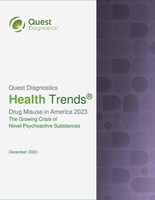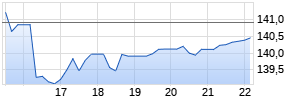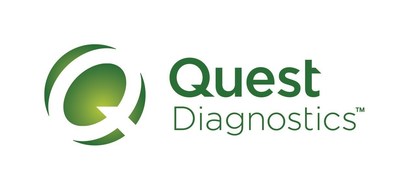
Quest Diagnostics Launches New 88-Compound Novel Psychoactive Substance Test Panel
PR Newswire
SECAUCUS, N.J., Dec. 19, 2023
Xylazine found in 1 in 12 specimens tested, finds new 'Drug Misuse in America' Health Trends® report on the rising polysubstance crisis
SECAUCUS, N.J., Dec. 19, 2023 /PRNewswire/ -- Quest Diagnostics (NYSE: DGX), the nation's leading provider of diagnostic information services, today unveiled its new confirmatory testing service for novel psychoactive substances (NPS). The new panel, which tests for 88 compounds, covers a broad array of drug classes, such as designer opioids, designer benzodiazepines, designer stimulants, fentanyl analogs, synthetic cannabinoids, and other illicit additives. Two of these classes are rapidly accelerating America's overdose crisis: other illicit additives (xylazine) and fentanyl analogs (acetyl fentanyl). The new test panel is designed to help healthcare providers detect potential drug misuse in patients prescribed controlled medications, such as opioids and other substances, amid a proliferation of synthetic or "designer" drugs in the nation's drug supply.
NPS are versions of established prescription and illicit drugs that are routinely chemically altered to enhance drug effects and evade tracking by law enforcement. As their chemical composition frequently evolves, conventional point-of-care and laboratory test methods may fail to detect NPS, increasing risks for individual patients and challenging efforts to understand their long-term health effects or prevalence in communities.
The Quest panel uses definitive liquid chromatography with advanced tandem mass spectrometry-based testing to establish NPS misuse. Quest's team of toxicologists, medical experts and data analysts will periodically review and update the panel to include the most relevant and prevalent substances present in communities, as reflected by trends in the company's nationally representative Health Trends® dataset and the latest reports from public health, academic research and law enforcement organizations.
Quest developed the panel to address the changing drug epidemic, as revealed by its nationally representatives Health Trends® report, "Drug Misuse in America 2023: The Growing Crisis of Novel Psychoactive Substances." Based on more than 3.6 million clinical laboratory drug tests performed by Quest Diagnostics in 2022, the report provides insights into the drug crisis and its shifts from misuse of prescription opioids and fentanyl to NPS. The report also includes analysis of 3,730 randomly selected "remnant" specimens tested using a pilot version of the new NPS test panel.
Approximately 13.1% of remnant specimens tested were positive for at least one NPS. Of these, the animal tranquilizer xylazine was found in 8.1%, or nearly 1 in 12 specimens tested, making it the most prevalent single NPS. Yet, non-xylazine substances, including fentanyl analogs and designer benzodiazepines, were found in 5% of remnant specimens tested, or roughly 40% of all NPS-positive test results.
These findings align with a recent report from the U.S. Centers for Disease Control and Prevention (CDC) highlighting the increasing connection between xylazine and opioid overdose deaths while also revealing growing misuse of other NPS.
Additional key findings include:
- Xylazine positivity among fentanyl-positive specimens was most prevalent in the Southeast (~90%), Northeast (~80%) and Eastern (~60%) U.S. regions. Results in the Southwest (<30%) and on the West Coast (<20%) suggest xylazine has yet to fully penetrate these U.S. regions.
- One third (32.7%) of fentanyl positive specimens were also positive for xylazine and nearly all (97.7%) specimens positive for xylazine were also positive for fentanyl.
- Nearly 1 in 5 (19%) amphetamines-positive specimens showed fentanyl combining.
- Heroin use rapidly declined, as positivity overall fell from 1.1% in 2021 to 0.4% in 2022.
The Health Trends analysis also found that specimens in areas with demographics linked to low income levels were nearly 7 times more likely to test positive for nonprescribed fentanyl than those linked to high-income communities. The researchers theorize that these differences are due to comparatively higher quality of care and generally greater access to resources in high-income communities.
To access the full Health Trends report, click here.
"Our Health Trends data demonstrates the importance of considering all possible NPS, not just xylazine, in clinical drug testing," said Harvey W. Kaufman, M.D., medical director and head of the Health Trends research program. "The faster public health and policy makers catch up with the growing problem of synthetic drugs, the greater the likelihood of curbing a dangerous and evolving drug epidemic before more lives are lost and more families and communities suffer irreversible harm."
For more information, please visit www.QuestDrugMonitoring.com.
Quest Diagnostics Health Trends studies are performed on aggregate deidentified laboratory data in compliance with applicable privacy regulations and the company's strict privacy policies, and follow procedures approved by the WCG Institutional Review Board. The present study's strengths include its large data set, geographic scope, and validated testing by the highly reliable mass spectrometry method. Its limitations include geographic disparities and inability to validate or contextualize test results with medical records. The terms high- and low-income communities refer to certain geographies that have median income levels that fall in the highest and lowest quintile as determined by the U.S. Census Bureau. For the full study methodology, including strengths and weaknesses, please refer to the full report.
About Quest Diagnostics Health Trends®
Quest Diagnostics Health Trends® is a series of scientific reports that provide insights into health issues, based on patient laboratory data, to empower better patient care, population health management and public health policy. The reports are based on the HIPAA-compliant Quest Diagnostics database of more than 60 billion deidentified laboratory test datapoints. The Quest database is believed to be the largest of its kind in healthcare. Health Trends research has yielded novel insights into allergies and asthma, cancer, COVID-19, diabetes, heart disease, hepatitis, influenza, Lyme disease, prescription drug misuse and workplace wellness. Quest Diagnostics also produces the Drug Testing Index (DTI)™, a series of reports on national workplace drug positivity trends based on the company's employer workplace drug testing data.
About Quest Diagnostics
Quest Diagnostics empowers people to take action to improve health outcomes. Derived from the world's largest database of clinical lab results, our diagnostic insights reveal new avenues to identify and treat disease, inspire healthy behaviors and improve health care management. Quest annually serves one in three adult Americans and half the physicians and hospitals in the United States, and our nearly 50,000 employees understand that, in the right hands and with the right context, our diagnostic insights can inspire actions that transform lives. www.QuestDiagnostics.com.
![]() View original content to download multimedia:https://www.prnewswire.com/news-releases/quest-diagnostics-launches-new-88-compound-novel-psychoactive-substance-test-panel-302019063.html
View original content to download multimedia:https://www.prnewswire.com/news-releases/quest-diagnostics-launches-new-88-compound-novel-psychoactive-substance-test-panel-302019063.html
SOURCE Quest Diagnostics

Mehr Nachrichten zur Quest Diagnostics Aktie kostenlos abonnieren
(Mit der Bestellung akzeptierst du die Datenschutzhinweise)

Hinweis: ARIVA.DE veröffentlicht in dieser Rubrik Analysen, Kolumnen und Nachrichten aus verschiedenen Quellen. Die ARIVA.DE AG ist nicht verantwortlich für Inhalte, die erkennbar von Dritten in den „News“-Bereich dieser Webseite eingestellt worden sind, und macht sich diese nicht zu Eigen. Diese Inhalte sind insbesondere durch eine entsprechende „von“-Kennzeichnung unterhalb der Artikelüberschrift und/oder durch den Link „Um den vollständigen Artikel zu lesen, klicken Sie bitte hier.“ erkennbar; verantwortlich für diese Inhalte ist allein der genannte Dritte.





